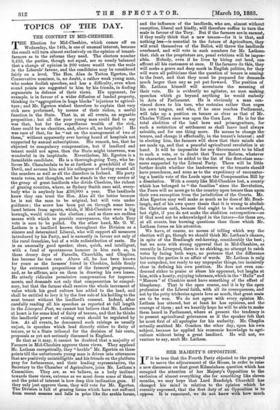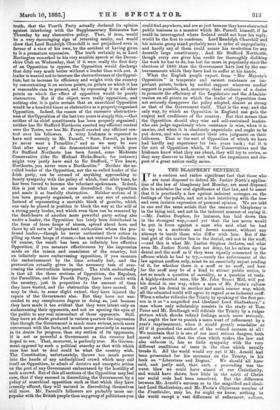HER MAJESTY'S OPPOSITION.
IF it be true that the Fourth Party objected to the proposal to move the adjournment of the House, in order to raise a new discussion on that great Kilmainham question which has occupied the attention of her Majesty's Opposition to the exclusion of almost everything else for something like eleven months, we may hope that Lord Randolph Churchill has changed his mind in relation to the opinion which he recently expressed, that the first duty of an Opposition is to oppose. It is rumoured, we do not know with how much
truth, that the Fourth Party actually declared its opinion against interfering with the Supplementary Estimates last Thursday by any obstructive policy. That, if true, would be a very encouraging sign of returning sanity, and would show that Lord Randolph Churchill is not prejudiced even in favour of a view of his own, by the accident of having given to it a premature expression. The truth certainly is, as Lord Hartington remarked in his very sensible speech at the Devon- shire Club on Wednesday, that if it were really the first duty of an Opposition to oppose, the Opposition would discharge that duty very much better without a leader than with one. A leader is wanted not to increase the obstructiveness of the Opposi- tion, but to increase its efficiency and weight with the country by concentrating it on serious points, on points on which it has a reasonable case to present, and by repressing it on all other points on which the effect of opposition would be purely obstructive. But if the object were really opposition, and nothing else, it is quite certain that an anarchical Opposition would be a hundred times as obstructive as a properly-organised Opposition. Indeed, the reason of the excessive obstructive- ness of the Opposition of the last two years is simply this,—that neither of its chief constituents has been properly organised ; neither has Sir Stafford Northeote exerted any efficient control over the Tories, nor has Mr. Parnell exerted any efficient con- trol over his followers. A witty Irishman is reported to have said recently to Mr. Parnell, "Sure, Parnell, ye know ye never were a Parnellite ;" and so we may be sure that after many of the demonstrations into which poor Sir Stafford Northcote has been forced, some Moderate Conservative (like Sir Michael Hicks-Beach, for instance) might very justly have said to Sir Stafford, "You know, Northcote, you never were a Northcotite." Neither the so- called leader of the Opposition, nor the so-called leader of the Irish party, can be accused of anything approaching to hearty sympathy with the policy of which, time after time, he has been forced to become the reluctant spokesman. Indeed, this is just what has at once discredited the Opposition and made it so fearfully obstructive. Neither section of it has been properly organised, or under any sort of control. Instead of representing a movable block of granite, which can only be placed in position to block the way at the will of a strong party leader, and which even then can be removed by the dead-heave of another more powerful party acting also under a leader, the Opposition has lately been distributed in the form of loose heaps of stones, spread about here and there by all sorts of independent authorities whom the pro- fessed leader,—though he never authorised their action in piling up these heaps of stones,—has not ventured to disclaim. Of course, the result has been an infinitely less effective Opposition, if you measure effectiveness by the impression made on the reason and conscience of the country, but an infinitely more embarrassing opposition, if you measure the embarrassment by the time actually lost, and the provocatIon actually given in the necessary task of over- coming the obstructions interposed. The truth undoubtedly is that all the three sections of Opposition, the Regulars, the Parnellites, and the Fourth Party, have lost credit with the country, just in proportion to the amount of time they have wasted, and the obstruction they have caused. It may be that, to some slight extent, they have injured the repute of the Government also. But they have not suc- ceeded to any conspicuous degree in doing so, just because they have made it too evident that they were intent only on embarrassing their opponents, and not on opening the eyes of the public to any real misconduct of those opponents. Still, they have no doubt produced in various quarters the impression that though the Government is much more serious, much more conversant with the facts, and much more genuinely in earnest in its desire for progress, than any section of its opponents, it is not as powerful a Government as the country had hoped to see. That, moreover, is perfectly true. No Govern- ment opposed by such a political anarchy as that with which ours has had to deal could be what the country wish. The Constitution, unfortunately, throws too much power into the hands of any undisciplined crowd which may call itself an Opposition, to admit of decisive and energetic action on the part of any Government embarrassed by the hostility of such a crowd. But of this all sections of the Opposition may feel sure, that if they succeed in discrediting the Government by a policy of anarchical opposition such as that which they have recently offered, they will succeed in discrediting themselves still more. Mr. Parnell's followers are probably more un- popular with the British people than any group of politicians you could find anywhere, and are so just because they have obstructed public business in a manner which Mr. Parnell himself, if he could be interrogated where Ireland could not hear his reply, would be the first to condemn. Lord Randolph Churchill and his minute group stand probably next in order of unpopularity, and hardly any of them could secure his re-election for any decently large constituency. And Sir Stafford Northcote, though every one gives him credit for thoroughly disliking the work he has to do, has lost far more in popularity since the elections of 1880 than the Government have lost by the em- barrassments which they have had to suffer at his hands.
What the English people expect from "Her Majesty's Opposition" is temperate and earnest resistance on im- portant points, broken by cordial support wherever cordial support is possible, and, moreover, clear evidence of a desire to promote the efficiency of the Legislature and the Adminis- tration on all points on which the leader of Opposition does not seriously disapprove the policy adopted, almost as strong as that of the Government itself. That is the way, and the only way, by which an Opposition in England can gain the respect and confidence of the country. But that means that the Opposition should obey wise and self-restrained leaders. who can judge sagaciously when resistance is wise, when it is unwise, and when it is absolutely unpatriotic and ought to be put down, and who can enforce their own judgment on their followers. That is the sort of Opposition of which we have had hardly any experience for two years back ; but it is the sort of Opposition which, if the Conservatives and the Irishmen know what they are about, they will try to revive, or they may discover to their cost what the impatience and dis- gust of a great nation really mean.



































 Previous page
Previous page